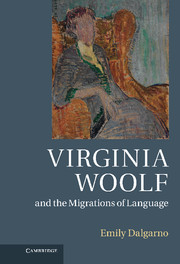Book contents
- Frontmatter
- Contents
- Preface
- Abbreviations
- The migrations of language: introduction
- Chapter 1 Translation and ethnography in “On Not Knowing Greek”
- Chapter 2 Antigone and the public language
- Chapter 3 Tolstoy, Dostoyevsky, and the Russian soul
- Chapter 4 Proust and the fictions of the unconscious
- Chapter 5 Translation and iterability
- Chapter 6 Assia Djebar and the poetics of lamentation
- Conclusion
- Bibliography of works cited
- Index
- References
Chapter 4 - Proust and the fictions of the unconscious
Published online by Cambridge University Press: 07 October 2011
- Frontmatter
- Contents
- Preface
- Abbreviations
- The migrations of language: introduction
- Chapter 1 Translation and ethnography in “On Not Knowing Greek”
- Chapter 2 Antigone and the public language
- Chapter 3 Tolstoy, Dostoyevsky, and the Russian soul
- Chapter 4 Proust and the fictions of the unconscious
- Chapter 5 Translation and iterability
- Chapter 6 Assia Djebar and the poetics of lamentation
- Conclusion
- Bibliography of works cited
- Index
- References
Summary
My great adventure is really Proust. Well – what remains to be written after that?
(To Roger Fry, Oct. 3, 1922: L2: 565)Woolf’s work took a new direction after 1922, the year in which she began to read À la recherche du temps perdu. Proust helped to shape the emphasis on feeling that is so problematic in her early work into a prose whose aim was to transform feeling into the language of spiritual apprehension. Her reading notes, “The Hours” manuscript, and her diaries reveal that several of the questions that she put to herself as she worked were in fact loose translations of particular passages in the Recherche where Proust engaged questions of memory and language. She responded, for instance, to Proust’s idea that the adjacent world of sleep focuses attention on the moment of awakening, when the sleeper leaves the place of dreams for the language of the waking world. Woolf read Proust largely in the translation of C. K. Scott Moncrieff, who simplified Proust’s extensive vocabulary of words for mental functions, by reducing it to conscious and unconscious. Although his translation conveniently brought the novel into territory familiar to English readers of Freud, his mistranslations resulted in Woolf’s preference for the Proustian image of the unconscious as the source, not of error and struggle as in Freud’s work, but of the artist’s unique access to the underwater world of the mind.
Although Woolf’s notes on the Recherche cover only the first two books, Swann’s Way and Guermantes, she and Vita Sackville-West read Sodome et Gomorrhe together. At the point where Woolf’s response to particular passages is less demonstrable at the level of language, the presence of Proust in her theory of writing may better be understood in terms of translation as interpretation. Woolf shared with Proust a sense of the unseen world that lies behind the seen, which is sometimes the world of the dead, and sometimes the hidden world of sexual preferences and behaviors that the narrator is forbidden to avow. The sign that represents a world so divided creates a text designed to accommodate historical controversies and contradictions, and is necessarily contingent. Scenes of translation in Orlando seize the occasion when a term that is undergoing redefinition becomes untranslatable, as a means to undermine the sign. As in the Recherche the naked female body prompts a scene of awakening that questions the language of sexual identity, while the text relegates gender to the arcane vocabularies of law and grammar. The final pages of Woolf’s novel rewrite the relationship of the translator to a dual readership in order to mediate the contradictions created by the untranslatable word.
- Type
- Chapter
- Information
- Virginia Woolf and the Migrations of Language , pp. 97 - 132Publisher: Cambridge University PressPrint publication year: 2011

